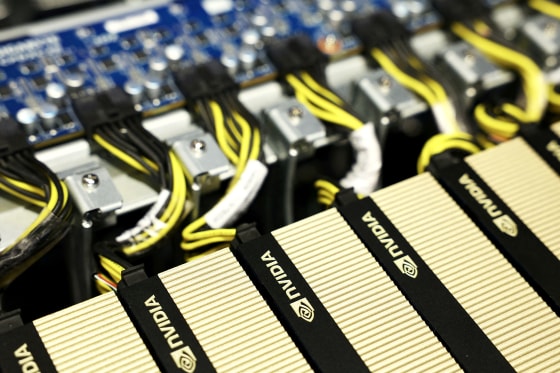China’s market regulator on Monday said that Nvidia violated the country’s anti-monopoly law, according to a preliminary probe, adding that Beijing would continue its investigation into the U.S. chip giant.
Shares of Nvidia were down around 2% in premarket trading.
Late last year, China’s State Administration for Market Regulation (SAMR) opened an investigation into Nvidia in relation to the acquisition of Mellanox and some agreements made during the acquisition. Nvidia acquired the Israeli technology company that creates network solutions for data centers and servers in 2020, in a deal that was approved by China at the time with certain conditions.
In a preliminary investigation, the SAMR said Nvidia had violated China’s anti-monopoly laws in relation to that acquisition and its conditions. China’s market regulator did not specify how Nvidia allegedly breached the country’s laws.
CNBC has reached out to Nvidia for comment.
The update from the SAMR has the potential to complicate trade talks between Chinese and U.S. officials that began on Sunday in Madrid, Spain.
Tensions between Beijing and Washington appear to be on the rise on the technology front. China opened two separate probes into semiconductors on Saturday: one is an anti-dumping investigation into certain chips imported from the U.S., while the other is an anti-discrimination scrutiny of U.S. restrictions on China’s chip industry.
Nvidia has had a tumultuous relationship with the Chinese market in recent months, as the company has been caught up in geopolitical volatility. Earlier this year, Nvidia’s H20 product, a chip that had been specially designed to comply with U.S. export restrictions, was blocked from being sent to China.
Nvidia CEO Jensen Huang has publicly called for American firms to be allowed to sell to China, saying the local artificial intelligence market will likely reach about $50 billion in the next two to three years. Huang said that, if American companies aren’t present in China, domestic players like Huawei will fill the void.
That lobbying appeared to work. Last month, Nvidia cut a deal with Washington that would allow the tech giant to resume chip sales to China in exchange for giving up 15% of that revenue to the U.S. government.
Huang and the U.S. government have been discussing the possibility of exporting a more advanced chip to China.
